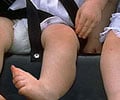Macrolide antibiotics should be used with caution during pregnancy and if feasible, alternative antibiotics should be prescribed until further research is available.

‘Macrolides have pro-arrhythmic potential, leading to various birth defects. They should be used with caution during pregnancy and if possible alternative antibiotics should be prescribed.’
Read More..




Previous studies suggest evidence of rare but serious adverse outcomes of macrolide use, especially for unborn babies. The adverse outcomes might be associated with the pro-arrhythmic (heart rhythm problems) potential of macrolides. Policy advice about macrolide use in pregnancy varies. Read More..
To address these uncertainties, a team of researchers based at UCL set out to assess the association between macrolide antibiotics prescribed during pregnancy and major malformations as well as four neurodevelopmental disorders (cerebral palsy, epilepsy, ADHD, and autism spectrum disorder) in children.
Researchers analysed data from 104,605 children born in the UK from 1990 to 2016 with a median follow up of 5.8 years after birth. A further 82,314 children whose mothers were prescribed macrolides or penicillins before pregnancy, and 53,735 children who were siblings of children in the study group acted as negative control cohorts.
Major malformations were recorded in 186 of 8,632 children whose mothers were prescribed macrolides at any point during pregnancy and 1,666 of 95,973 children whose mothers were prescribed penicillins during pregnancy.
After taking account of potentially influential factors, the researchers found macrolide prescribing during the first three months (the first trimester) of pregnancy was associated with an increased risk of any major malformation compared with penicillin (28 v 18 per 1000) and specifically cardiovascular malformations (11 v 7 per 1000).
Advertisement
Macrolide prescribing in any trimester was also associated with a slightly increased risk of genital malformations (5 v 3 per 1000). No statistically significant associations were found for other system specific malformations or for any of the four neurodevelopmental disorders.
However, results were largely unchanged after further analyses, suggesting that the findings withstand scrutiny.
If the associations are shown to be causal, the researchers estimate that an additional 4 children with cardiovascular malformations would occur for every 1000 children exposed to macrolides instead of penicillins in the first trimester.
"These findings show that macrolides should be used with caution during pregnancy and if feasible alternative antibiotics should be prescribed until further research is available," they conclude.
Source-Eurekalert












